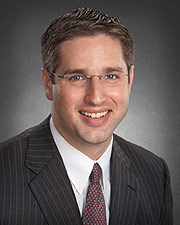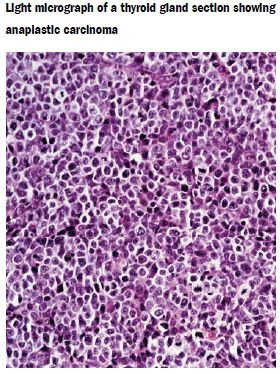Reevaluating Anaplastic Thyroid Cancer: Aggressive Treatment May Extend Life and Improve Its Quality
Anaplastic thyroid cancer is a diagnosis no physician wants to deliver. Although the extremely aggressive malignancy is known among otolaryngologists as resistant to all treatments, specialists at Memorial Hermann-Texas Medical Center can now offer a measure of hope for patients willing to undergo aggressive treatment of the disease.
 “Anaplastic thyroid carcinoma presents physicians with the archetypal nightmare cancer scenario: we walk into the exam room and tell the patient he has three months to live,” says Ron J. Karni, MD, an assistant professor in the Department of Otorhinolaryngology—Head and Neck Surgery at UTHealth Medical School, who specializes in the treatment of head-and-neck cancer. “Untreated patients die quickly and terribly from asphyxiation. The diagnosis fills us with such grief that we teach each other in almost mythological fashion, from generation to generation, that nothing can be done for these patients.”
“Anaplastic thyroid carcinoma presents physicians with the archetypal nightmare cancer scenario: we walk into the exam room and tell the patient he has three months to live,” says Ron J. Karni, MD, an assistant professor in the Department of Otorhinolaryngology—Head and Neck Surgery at UTHealth Medical School, who specializes in the treatment of head-and-neck cancer. “Untreated patients die quickly and terribly from asphyxiation. The diagnosis fills us with such grief that we teach each other in almost mythological fashion, from generation to generation, that nothing can be done for these patients.”
Dr. Karni considers this approach outmoded and dangerous. “Today, we’re saying, ‘Yes, there is something we can do.’ Data from the literature indicate that if we diagnose patients early enough, surgery to remove the tumor and any associated lymph nodes, combined with radiation and chemotherapy, may add significant quality of life and improve the outcome.”
Anaplastic thyroid cancer accounts for about 1 percent of all thyroid malignancies. In most cases death occurs in less than a year after diagnosis as a result of aggressive local growth and compromise of vital structures in the neck. The malignancy has a median survival of four to five months from the time of diagnosis, with rare long-term survivors.
 “The important word here is rare,” says Dr. Karni, who currently is following a patient two years after treatment for anaplastic thyroid carcinoma. “We’re finding that some patients with limited locoregional disease have the potential for extended survival beyond what was traditionally taught by the medical sages. Many tumors are amenable to surgery by skilled head-and-neck cancer surgeons willing to take on an aggressive tumor. Because we’re an academic medical center, we see many cases and have treated patients who are remarkably long-term survivors. The fact that we can offer them multidisciplinary expertise in head-and-neck surgery, thoracic surgery, medical oncology, radiation oncology, endocrinology and morphoproteomics helps improve our outcomes.”
“The important word here is rare,” says Dr. Karni, who currently is following a patient two years after treatment for anaplastic thyroid carcinoma. “We’re finding that some patients with limited locoregional disease have the potential for extended survival beyond what was traditionally taught by the medical sages. Many tumors are amenable to surgery by skilled head-and-neck cancer surgeons willing to take on an aggressive tumor. Because we’re an academic medical center, we see many cases and have treated patients who are remarkably long-term survivors. The fact that we can offer them multidisciplinary expertise in head-and-neck surgery, thoracic surgery, medical oncology, radiation oncology, endocrinology and morphoproteomics helps improve our outcomes.”
Dr. Karni makes no promise of a cure. “In general anaplastic thyroid cancer is not a happy-ending story,” he says. “What we can offer is longer life and better quality of life to patients who are diagnosed early, have limited disease and are treated aggressively with surgery, chemotherapy and radiation. There’s a trend in the literature mirroring our approach. Because this is an evolving story, it’s important to give patients the opportunity to be seen and evaluated by a dedicated thyroid surgeon rather than being given palliative treatment and sent home to die.”